Anti-scale for washing machines: how to use + review of popular manufacturers
Solid sediment on the internal elements of equipment often causes breakdowns of household equipment.An anti-scale solution for washing machines will help solve the problem - the product quickly removes deposits from the heating element and other parts.
Some food ingredients have a similar effect. To achieve maximum effect without harming the unit, you should choose a high-quality product and strictly follow the instructions.
We will tell you which cleaner you should give preference to - the article provides a rating of the most effective chemicals that have proven their effectiveness in practice. And adherents of traditional methods will be able to choose for themselves a proven recipe from improvised means.
In addition, we will talk about the feasibility and procedure for mechanical cleaning of the heating element, and also outline preventive measures that should be followed when operating the washing machine in order to prevent the formation of scale on the working units of the unit.
The content of the article:
Causes and first signs of scale appearance
The formation of sediment is a real scourge not only of washing machines, but also of all household devices whose operation is based on heating running water.Hard deposits appear on parts responsible for heating and evaporating the liquid. As a rule, a heating element - a tubular electric heater - copes with this task.
The likelihood and speed of clogging of the heating element depends on the quality of the incoming water, the washing temperature and the frequency of use of the unit. If the machine regularly operates at 60° and above, then salt deposits accumulate more intensely.
The first signs of excessive scale formation:
- increased noise of the washing machine during the water heating stage;
- clothes become harder to wash, light-colored linen takes on a grayish tint;
- the machine does not heat up well - the door glass remains cold throughout the entire washing cycle;
- the appearance of an unpleasant odor on washed items and inside the drum;
- to achieve a good result you have to increase the amount of powder.
To finally verify the assumptions, it is advisable to inspect the heating element itself. The heating element is located under the washing machine tank or is slightly offset from the center to one side.
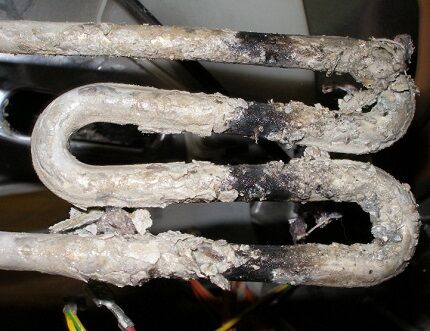
If the presence of deposits has been diagnosed, then it’s time to begin descaling measures. Timely cleaning will help restore the normal efficiency of the heating element and avoid a more serious problem - expensive equipment repair.
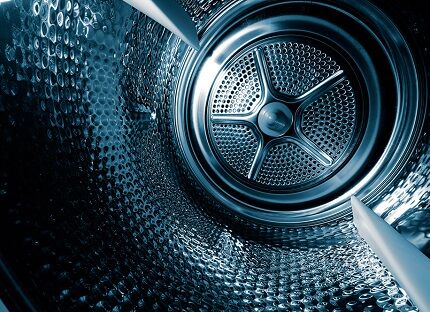
Typical composition and effect of the drug
To provide emergency assistance to a washing machine, a chemical agent has been developed - anti-scale agent. This is the general name for most anti-scaling products; its analogues are: anti-scaling agent, scale precipitator, etc. The drugs are available in the form of suspensions, pastes, powders and tablets.
The active ingredient in the cleaner is acid. Many manufacturers use citric, sulfamic or oxalic acid. Their specific gravity in the anti-scale composition for washing machines is about 30%.
Additional required components are thiourea and ammonium chloride. In addition to the above ingredients, the composition includes: dyes, flavors and other substances that have a preventive effect.
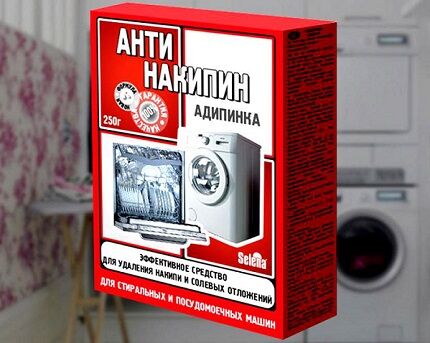
The principle of operation of the “destroyer” is extremely simple - acids act on hard deposits and soften them. The deposit peels off from the mechanism parts and is removed with a water stream through the drain hose.
The use of anti-scale to combat scale crust has the following advantages:
- effectiveness of the drug – the result is achieved in one use;
- safety for structural elements — if the dosage is observed, the components of the cleaner do not harm the rubber seal and plastic components of the washing machine;
- efficiency — the product is enough for several uses.
If we talk about the minuses, it is worth noting the likelihood of clogging the drain channel with large pieces of scale.The remaining disadvantages are associated with non-compliance with the rules for using anti-scale agent - an excessive amount of the product has a negative effect on the rubber seal.
Your first and foremost task is to read the instructions. Depending on the concentration of active substances, the permissible frequency of use and amount of anti-scale agent are determined.
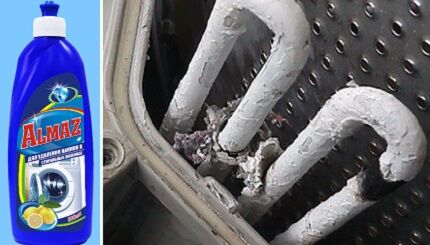
Regardless of the chosen chemical, you should adhere to the general rules for using antiscale:
- use at idle speed - without loading laundry;
- recommended washing mode – 30-60°C;
- the drug is poured into a drum or powder cuvette.
More precise recommendations are shown on the packaging. When working with scale precipitator, be sure to use latex gloves to avoid getting a chemical burn. While the heating element is being processed, the room must be well ventilated - forced exhaust must be turned on in the bathroom or kitchen.
Review of products from popular brands
We list the most popular and effective, according to users, means for combating scale.
Furman (Ukraine)
Powdered cleaner, packaged in disposable 40 g bags. One package is enough to remove deposits from heating elements. Furman contains inorganic acid and an electrochemical corrosion inhibitor instead of citric acid.
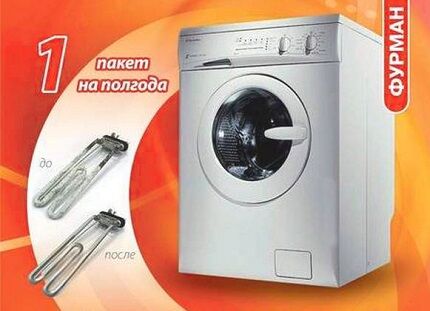
The manufacturer recommends cleaning by setting the wash cycle to 60°C.After the procedure, the machine must be “run” idle at the minimum temperature in order to completely remove scale particles.
Users note the high efficiency, ease of use and low cost of the drug.
Topper (Italy)
The scale precipitator is a joint development of two European equipment manufacturers: Miele And Bosch. The product has been tested and recommended for cleaning washing machines and dishwashers.
The active ingredient in the express cleaner is anhydrous citric acid. Antiscale contains acid sulfite; it is this additive that is responsible for the safety of the internal rubber parts of the automatic machine.
The maximum temperature for using Topper is 60°C, the time interval is 1-3 times a year. The frequency of cleaning depends on the hardness of the water. The approximate price of anti-scale is 3-4 USD.
Magic Power (Germany)
An effective product for removing old hard deposits. Antiscale is available in liquid and powder form.
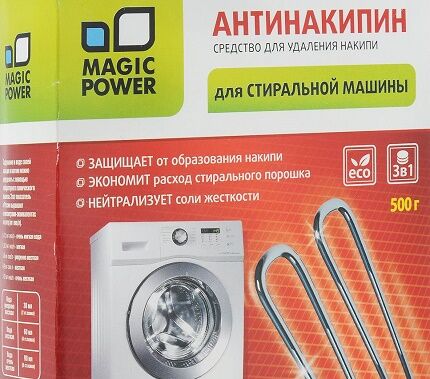
Luxus Professional (Russia)
The universal liquid cleaner is suitable for servicing not only washing machines, but also electric kettles, dishwashers, irons and coffee makers.
Antiscale is developed on the basis of substances that are harmless to humans: citric and aminosulfonic acid, food coloring. The drug is available with apple and lemon flavor. The capacity of the container is 500 ml, which is enough for two cleanings. Buying a Luxus Professional bottle will cost 5-6 USD.
Top-House (Germany/Russia)
A popular German brand of household chemicals has established production in different European countries. Powder for quickly combating scale is produced in Russia, a gel with a similar effect is produced in Germany.
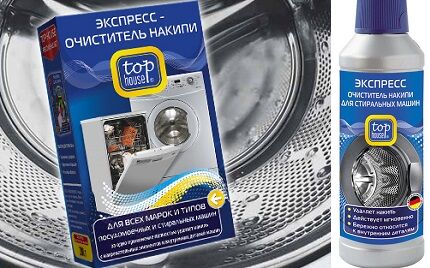
Top-House received a lot of positive user feedback. Consumers note its high efficiency - the product quickly removes accumulated scale and cleans the drum.
Doctor TEN (Belarus)
A distinctive feature of the drug is that in addition to performing the main task of cleaning the heating element, Doctor TEN has an antibacterial effect.
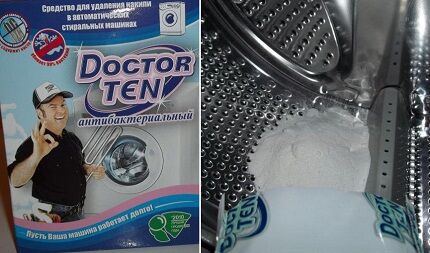
Antiscale Selena (Russia)
There are two forms available: powder and emulsion. The manufacturer recommends using a washing mode of 30-40°C when cleaning, frequency of use is every quarter.
Not all consumers respond positively to the product. Among the disadvantages are: insufficient efficiency, risk of damage to the seal.
Cinderella (Russia)
Popular household chemicals produced by Russian manufacturers are in demand due to their wide distribution network and affordable prices. However, reviews of the drug are not always rosy.
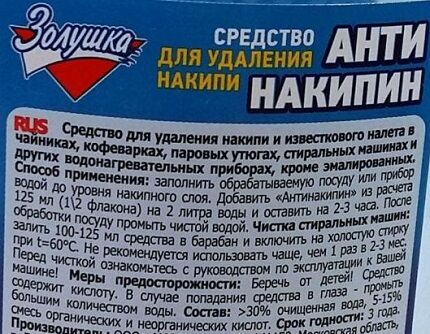
Additional disadvantages of Cinderella include: high consumption of the drug and insufficient effectiveness.According to users, the product does not soften deposits well, especially old ones.
Scrubman (Russia)
Another well-known domestic drug based on acids with the addition of a complexing agent. According to the manufacturer, the product fights scale at the ionic level and has a disinfecting effect on the internal parts of the unit.
In addition to cleansing the heating element from solid deposits, aninakipin Scrubman No. 1 removes unpleasant odors from the drum, destroys fungus and mold.
The consumption of the product depends on the degree of water hardness. If the indicator is not precisely established, then you need to use the dosage as for the average level. An alternative is to focus on the “carrying capacity” of the machine. A bag of dry powder (250 g) is designed for a washing machine up to 6 kg.
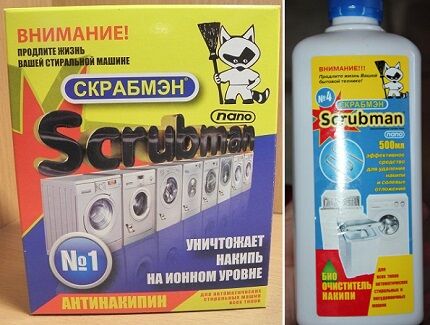
Un Momento (Russia)
Liquid cleaner concentrate consisting of organic food acids and a mixture of alkali metal salts. Effectively copes with limescale deposits and carefully cleans plastic, rubber, and steel elements of the washing machine.
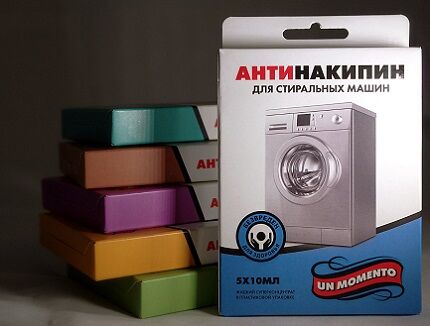
In addition to the listed drugs, similar products from manufacturers deserve attention: Bork, Nast, W5, Tygon and Greenfield Rus.
The procedure for using the purchased Antiscale product is presented in the video:
How to replace Antiscale? Traditional methods
The action of most purchased products is based on breaking down the structure of salt deposits with various acids, which means that improvised acid-containing substances are also suitable for cleaning heating elements. The role of anti-scale at home is performed well by citric acid and vinegar.
Option #1 - citric acid
If the washing machine is used intensively, the heating element should be cleaned once every 4 months. If the unit is turned on rarely, then the frequency of plaque removal is once every six months.
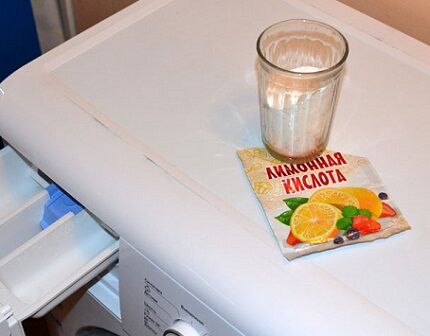
Subsequence cleaning with citric acid:
- Unload all laundry from the machine.
- Measure out the required amount of cleaning product.
- Pour 1/5 of the citric acid into the drum, the rest into the powder cuvette.
- Select the longest and highest temperature wash cycle and turn on the machine.
- At the end of the work, run the washing machine in the rinsing mode. If possible, select the high water level option.
Finally, wipe the drum with a soft cloth and clean the drain filter. You need to make sure that no scale particles remain in the rubber seal.
Video instructions will help you properly clean the washer with citric acid:
Option #2 - vinegar
The remedy is very effective, but has not gained due popularity for two reasons. Firstly, acetic acid has a pungent odor - the aroma remains in the machine for some time after processing. Secondly, vinegar is more aggressive than citric acid, so it should be used with caution so as not to damage the seal.
Work progress:
- Empty the drum of things and pour 200 g of vinegar into it.Add 1/3 cup of acid solution to the powder compartment.
- Set the program to 90°C with a long wash cycle. Click "Start".
- After 5-10 minutes of work, pause in mode for 1 hour.
- After the time has expired, resume the program.
After cleaning, you need to run a rinse cycle to remove any remaining vinegar and dirt.
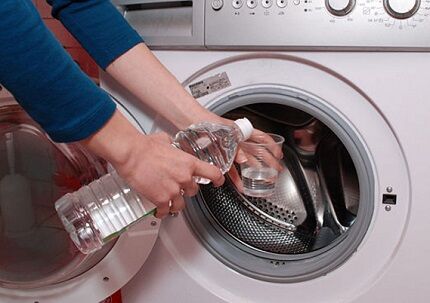
Some craftsmen claim that a machine can be cleaned with Coca-Cola. To remove deposits you will need 5 liters of drink. The technology is similar to using vinegar.
Mechanical cleaning of heating elements
Understanding the structure of an automatic machine and possessing primitive technical skills for servicing equipment, you can clean the heating element manually. However, it is better to entrust the assembly of the washing machine to a specialist - due to mistakes made, the device may pass current.
The mechanical method is effective - you can clearly see the condition of the heating element before and after treatment.
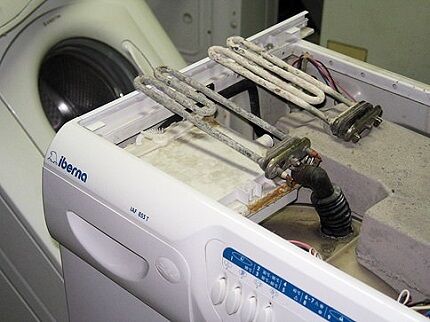
General procedure:
- Remove the rear wall of the unit.
- Carefully remove the heating element.
- Using anti-scale agent, clean the heating element; an alternative method is to soak the part in lemon juice or vinegar.
- Remove scale, clean, dry and install heating element. Reassemble the machine in reverse order.
During disassembly, you should also inspect the condition of the moving parts of the drum. Eating them is a more difficult task, which is not recommended to be done on your own.
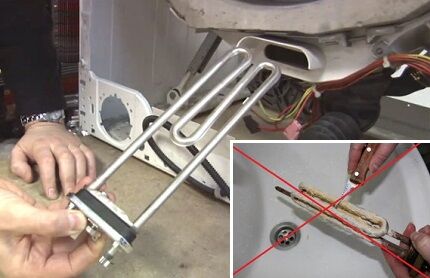
If the actions taken did not give the expected effect, then most likely the heating element requires replacement. You can learn more about choosing and installing a heating element from this article.
Measures to prevent scale formation
Following the recommendations for operating equipment allows you to slow down the appearance of deposits. Basic rules: wash preferably in a mode that heats water to 60°C, use specialized powders for automatic washing machines.
Some measures are aimed at reducing the carbonate hardness of tap water. Let's find out which of them are more effective.
Calgon and analogues: benefit or harm
When thinking about how to prevent the appearance of a crust on the heating element, many people remember the much-advertised Calgon product. However, service center technicians are skeptical about the “miracle” drug.
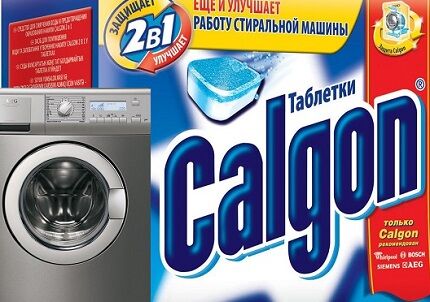
In principle, Calgon copes with the task, but is its use really necessary?
Experts' arguments:
- The composition of powders intended for automatic machines already includes water softeners. This means adding Calgona is a waste of money.
- Cheaper analogues have a similar composition and a similar effect: Yplon, Tyron, Alfagon.
- An excess of softener is as harmful as calcium and magnesium salts themselves.The drug is not recommended for continuous use; it is better to avoid it if the machine operates at temperatures up to 60°C.
There is an opinion that the constant use of Calgona and its analogues makes the surface of the heating element hard, as if cemented. Due to the formation of a hard crust, the heater runs the risk of quickly burning out.
Magnetic converter – neutralization of salts
An effective and safe method to prevent the formation of a salt crust is a small-sized insert device with high magnetic induction. An overhead or mortise device is introduced into the water supply system and changes the quality of running water.
The converter operates as follows. Under the influence of a magnetic field, salts crystallize and lose their ability to form groups - to settle on equipment parts.
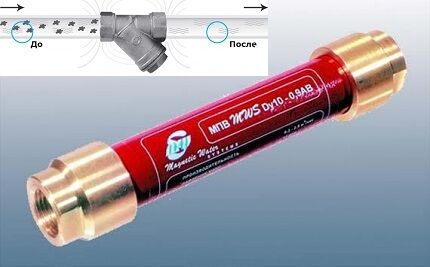
When choosing a magnetic method of prevention, you should take into account a number of nuances of using the converter:
- The device works effectively in a relatively small range, so it must be fixed closer to the washing machine.
- When purchasing a converter, you should ask the seller for a quality certificate indicating the maximum operating temperature. Cheap analogues quickly lose their properties in a warm environment.
- The magnetic cleaner is installed on the cold water supply pipe.
Water treated with a converter can only be used for technical purposes; it is not suitable for cooking. Experts talk about the inhibitory effect of the liquid.
Conclusions and useful video on the topic
Assessing the condition of the heating element and descaling using citric acid, the result before and after treatment:
Regular use of anti-scale is a necessary condition for the effective operation of the heating element and extending the service life of the washing machine as a whole.
The main requirement for using household chemicals is to follow the manufacturer’s recommendations regarding the dosage of the cleaning product and the safety precautions for its use. Household chemicals can be replaced with equally effective folk remedies: lemon juice and vinegar.
Have you ever had to deal with scale in your washing machine? Please tell us what product you used and whether you were satisfied with the result. We are waiting for your comments, questions and tips on cleaning the washing machine and preventing scale formation - the contact form is located below.
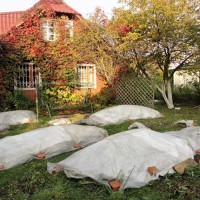


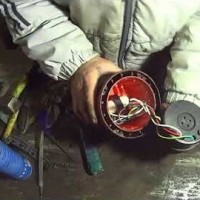
I remove scale from the kettle in the most basic way: I add citric acid to water and boil it. I recently read that Sprite soda helps in the same way. I tried it and it worked. The teapot is shining. I’m wondering if it’s possible to descale a washing machine with Sprite? After all, it still contains sugar, you never know... Maybe someone tried it? Share your experience.
I don’t know about Sprite, but I heard that they clean with Coca Cola. Pour 4-5 liters of drink and turn it on. But I wouldn't take that risk. There is a proven working method with citric acid.
Hello. In addition to phosphoric acid, such carbonated drinks also contain other elements that can leave a residue on the washing machine or destroy its important elements.We do not recommend using such products, especially since on average, to clean a washing machine with carbonated water, it is recommended to use 5 liters of the drink, which is unreasonably disproportionate in price to decent descalers.
And most likely, it was not Sprite that was recommended to you, but Coca-Cola.
Comparing a kettle and a washing machine is fundamentally wrong! Yes, the kettle can be easily descaled using citric acid. But, look at the design of the electric kettle: the heating plate at the bottom and the body itself are all that citric acid comes into contact with in boiled water. A washing machine is a completely different technique and citric acid will do more harm than good. I will try to briefly explain why.
Firstly, citric acid can react with chlorine. Secondly, not only the heating element will be exposed, but also other elements, including those on which the drum is attached, as well as various kinds of seals and hoses. Therefore, to safely descale, you need to disassemble the washing machine and clean all the elements manually. It takes longer, but such a preventative measure will significantly extend the life of the washer.
The optimal and radical solution would be not to use special anti-scale products, but to install filters to purify the water supplied to the washing machine.
It seems to me that these newfangled branded anti-scale products, such as Calgon and others, are nothing more than a simple marketing ploy to pump out money. Now you can even buy a powder that contains components that actively fight scale. Personally, I don't use anything like that. The machine has been working for more than 8 years, and there are no complaints.Just once every three months, maybe once every six months, I turn on the boiling mode at 90 degrees and add a couple of packs of citric acid instead of powder. That's all the wisdom.
This is what I want to write about the effect of vinegar as a descaling agent: after using it in the washing machine, I did everything the same way and the proportion is the same as written here, first the machine broke down, and then when I used it, descale the kettle, the kettle immediately broke. So think about it, it's a coincidence or what. Well, the master said that it was from vinegar, so who to believe? Now my husband has installed a magnetic converter, we will wait for the results.
Can you be a little more specific: what exactly broke? Why didn't you test the method on a teapot first? And so the machine broke down and you finished off the kettle. It is possible that the recommendations for the dosage of vinegar were violated, and you also need to pay attention to the percentage of acetic acid in the composition.
It is best to descale a kettle with citric acid, I checked it on my kettle more than once. Now I have a reverse osmosis filter on the tap, so scale does not form on the kettle at all.
In a washing machine, scale forms on the heating element, so it is more logical and safer to disassemble the washing machine, take out the heating element and descale it manually. As for me, this is the most optimal and safe option. But folk remedies, such as lemon juice or vinegar, are always a risk. Since these substances come into contact with many elements that are not designed for this.
For a long time I used citric acid to clean my machine until I discovered that my machine was leaking and stopped heating.They called the repairman, and it turned out that she had successfully eaten the gasket in the machine and the heater flew off :)
The master said so, and said that it’s not for nothing that they sell so many products now - if only you could just clean them with lemon, yeah! These are not Soviet babies. I keep the new washing machine on hand and clean it with an anti-limescale agent from the BAGI Shumanit-Avnit company. It is not free-flowing and therefore does not generate dust when I pour it into the washing powder compartment. Then I run one wash and that’s it. As a result, it removes scale and prevents rust from forming. Everything has its use, I am convinced of this and advise you.
Lemon is unlikely to clean your coffee machine properly. Most likely, all the silicone and rubber gaskets will eventually gradually corrode and the coffee machine will slowly die. I think there is no point in saving money here; it’s easier not to experiment and purchase a specialized product for these purposes that will never harm the coffee machine.
Sorry, but we're talking about washing machines, not coffee machines.
Yes, guys, this is a tough one. I have a chemical production workshop. There is also water treatment. Regarding magnetic something like a filter, do not buy it under any circumstances. The best descaler for price and quality is sulfomic acid + a lemon corrosion inhibitor is added for show off. Although it does remove the scale a little.
What is the difference in the drum capacity - is it 6 kg or more? It is important whether your machine takes 30 liters or 80 liters per cycle. Based on this, your solutions will be completely different. Calgon is also a complete scam; all its components are contained in washing powder.
Another option is to install reverse osmosis in your apartment and there will be no scale at all. And you can drink water, it costs from 8 thousand.
Quote from the article: “There is an opinion that the constant use of Calgona and its analogues makes the surface of the heating element hard, as if cemented. Due to the formation of a hard crust, the heater runs the risk of quickly burning out.”
You never know what opinion exists. And, excuse me, it is not appropriate for an expert to manipulate existing opinion on unverified facts.
Who uses citric acid for descaling, is the machine not broken? I hadn’t done anything before, the heating element burned out, they just changed it and I started wondering what to do...
I was dismantling the washing machine. It is made in such a way that the heating element is located in the place of the circulating flow. The car was 10 years old at that time. There was practically no growth, a light coating (not like sometimes the horror stories in advertising are shown), no cleanings or additives were used. More dirt accumulates than scale. Everything depends on water. By the way, they wrote it correctly here, it’s better to install a good filter. Moreover, machines do not consume a terrible amount of water per cycle, just like dishwashers. But all these acids and so on will kill the machine anyway. Here I am pouring water from reverse osmosis into the coffee machine. Has been working for more than 10 years. No scale. It was pouring from the tap in the office - they tried to clean it up. So it is necessary to treat the cause and not the effect.